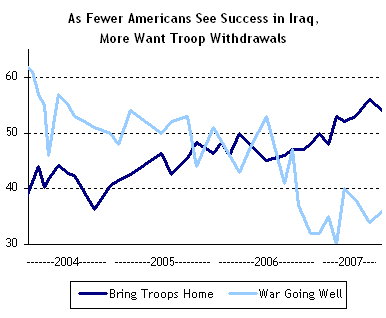by Andrew Kohut, President, and Jodie T. Allen, Senior Editor, Pew Research Center
No question looms larger on the national scene than how Americans will react to the progress reported by Iraq commander Gen. David Petraeus and U.S. Ambassador Ryan Crocker when they testify before Congress next week. A look at the course of opinions about the Iraq conflict over the past few years suggests that two crucial but opposing factors in American thinking will likely shape the public’s response. The first is the growing perception that the war is a failing enterprise. The second is the public’s continuing awareness of the risks associated with a hasty retreat.
Public calls for troop withdrawals have strengthened over the past two years as Americans have come increasingly to believe that the United States is engaged in a war with no prospect of success.
For first two years of the conflict, Americans largely believed that the war effort was going at least fairly well and that the U.S. should not with draw its troops until the situation in Iraq was stable. By October 2005, however, a 53%-majority of the public had come to the view that the U.S. military effort in Iraq was not succeeding.
This shift in opinion coincided with another important change in public attitudes. That month, for the first time since the invasion of Iraq in March 2003, as many Americans said they favored withdrawing U.S. troops from Iraq “as soon as possible” as said they favored keeping U.S. troops in Iraq “until the situation there has stabilized.”

As judgments about the war worsened in the following months and years, calls for withdrawals also trended upward. By July of this year, a Pew poll found nearly six-in-ten Americans saying that the U.S. military effort in Iraq was going not too well or not at all well. Correspondingly, the poll found a 54%-39% margin in favor of bringing U.S. forces home. The obvious question is: given these trend lines, can enough of a case for progress be made by the Bush administration to revive public patience with the war effort literally overnight?
National polls this summer have found a majority of respondents believing that the surge has not changed or worsened the “situation in Iraq. So, at the moment the public may seem in no mood to compromise with those of opposing views on Iraq. Asked in July how they would want their congressional representative to vote on a funding bill that would require a troop withdrawal to be “completed by next year,” a strong 63%-majority said they would want them to vote in favor of the measure. Only 29% preferred their representative to vote against such a timeline.And nearly identical majorities of those favoring a timeline for withdrawal and those opposing one said they wanted political leaders who agreed with them to insist on their position (57% and 59% respectively).
Yet responses to other questions suggest that the public may not be as adamant as it appears at first glance. And a second factor may work in the administration’s favor — the public’s apparently malleable definition of how soon is “as soon as possible” when it comes to repatriating U.S. armed forces.
While a majority of the public wants out of Iraq, most do not want a rush for the exit. And many continue to see risks associated with getting out even as they call for it. Among supporters of troop withdrawals in the July survey, those saying that the withdrawals should “be gradual over the next year or two” outnumbered those favoring “immediate withdrawal of all troops” by a ratio of 3-2, a balance that has remained more or less constant since December 2005. Americans have expressed very strong opinions about getting troops out of Iraq, but beneath the strong opinions, there has been an acknowledgment of the downside of withdrawal.
Pew’s recent polling shows the public is sensitive to possible consequences for the Iraqi people if America packs up and makes for the borders. Nearly six-in-ten (58%) see the chances of a civil war in Iraq increasing (only 6% foresee a decrease) while 55% think it more likely that al Qaeda would establish terror bases there.Moreover, in an April poll, 45% of Americans said that if the U.S. withdraws its troops while the situation in Iraq is still unstable, a terrorist attack on the U.S. would become more likely.
On the other hand, nearly as many among the public — 41% — felt that a terrorist attack on America would become more likely if U.S. troops remained in Iraq for many years. Moreover, by July, roughly half of the public (49%) had reached the conclusion that, come what may, the United States will probably (32%) or definitely (17%) fail to achieve its goals in Iraq, compared with 43% who felt it would definitely (9%) and or probably (34%) win out in the end.
These ambivalent views about the Iraq conflict offer both a dilemma and a possible opportunity for policymakers. Even as they await the Petraeus progress report, lawmakers on both sides of the aisle appear to be sampling the market for a saleable compromise. They may find they get traction with the public by making the case that any compromise would be only the beginning of a process, one that would play out over time as events dictated.




